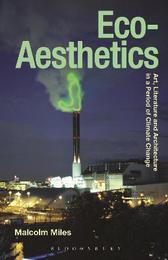
|
Eco-Aesthetics: Art, Literature and Architecture in a Period of Climate Change
Hardback
Main Details
| Title |
Eco-Aesthetics: Art, Literature and Architecture in a Period of Climate Change
|
| Authors and Contributors |
By (author) Malcolm Miles
|
| Series | Radical Aesthetics-Radical Art |
|---|
| Physical Properties |
| Format:Hardback | | Pages:256 | | Dimensions(mm): Height 216,Width 138 |
|
| Category/Genre | Theory of art
Philosophy - aesthetics
Environmentalist thought and ideology |
|---|
| ISBN/Barcode |
9781472529107
|
| Classifications | Dewey:111.85 |
|---|
| Audience | | Professional & Vocational | |
|---|
| Illustrations |
36 illus
|
|
Publishing Details |
| Publisher |
Bloomsbury Publishing PLC
|
| Imprint |
Bloomsbury Academic
|
| Publication Date |
8 May 2014 |
| Publication Country |
United Kingdom
|
Description
By moving beyond traditional aesthetic categories (beauty, the sublime, the religious), Eco-Aesthetics takes an inter-disciplinary approach bridging the arts, humanities and social sciences and explores what aesthetics might mean in the 21st century. It is one in a series of new, radical aesthetics promoting debate, confronting convention and formulating alternative ways of thinking about art practice. There is no doubt that the social and environmental spheres are interconnected but can art and artists really make a difference to the global environmental crisis? Can art practice meaningfully contribute to the development of sustainable lifestyles? Malcolm Miles explores the strands of eco-art, eco-aesthetics and contemporary aesthetic theories, offering timely critiques of consumerism and globalisation and, ultimately, offers a possible formulation of an engaged eco-aesthetic for the early 21st century.
Author Biography
Malcolm Miles is Professor of Cultural Theory in the School of Architecture, Design & Environment at the University of Plymouth, UK.
ReviewsTorn between hope and despair about the disastrous consequences of climate change, the question runs burning through our cultural life: what role can art, literature and architecture still play? Reading Malcolm Miles' book we learn that there is no one-line answer on this question. Page by page however he teaches us that there is a beauty in critical thought and perspective on what is going to happen. Taking a wide range of positions and cases into examination, Miles convinces the reader that the ruins of climate change, at least, do not need to be the ruins of our civilization. -- Frank Eckardt, Professor for Urban Studies and Social Research, Bauhaus-Universitat Weimar, Germany Malcolm Miles' Eco-Aesthetics is an erudite, elegant, informed and critical account of art in the age of seemingly inexorable climate change * Owen Hatherley * In this impressive and wide-ranging book, Malcolm Miles sets out lucidly the case for a new approach to aesthetics that can form part of a 'long revolution' in our response to ecological issues. Balanced carefully between hope and despair, it serves both a cri-de-coeur and a celebration of the human creative spirit in the face of a global capitalist system which shows little interest in such values. * Murray Fraser, Professor of Architecture and Global Culture, Vice-Dean of Research for the Bartlett Faculty of the Built Environment, UCL, UK. * In this slim, elegantly written volume, Miles charts a radical new path for the field of environmental aesthetics ... Miles is not naive: he does not present art as something that can magically bring today's environmental state of emergency into sharper focus. Nonetheless, through rethinking and contextualizing ecologies, aesthetics, and cultures of climate change by reference to art, Miles brings readers face-to-face with both the despair of Earth's future and the hope that one can indeed take some positive action against the ravages of climate change. The hope illuminated so intelligently in this book is an offering of beauty, which, as "radically other to routine," can indeed re-inflect today's culture. Summing Up: Highly recommended. Lower-division undergraduates and above; general readers. -- E. Millan, DePaul University * CHOICE *
|